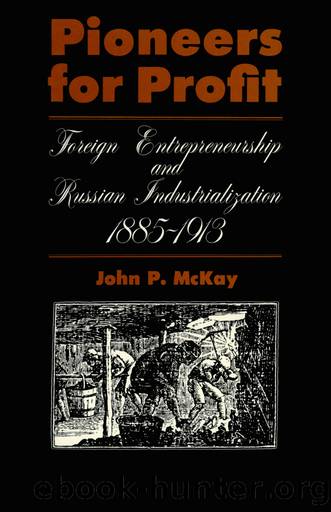Pioneers for Profit by John P. McKay

Author:John P. McKay [McKay, John P.]
Language: eng
Format: epub
Tags: History, General, Business & Economics, Investments & Securities
ISBN: 9780226559926
Google: 1vCRavSNZBwC
Publisher: University of Chicago Press
Published: 2015-03-12T01:42:19+00:00
8
RELATIONS WITH STATE AND SOCIETY
The nature of relations between the Russian state and foreign enterprise is of great interest because so much of Russian economic development after 1885 was due to their combined efforts. Were relations generally good? If so, does this mean Russiaâs elite simply sold out its country to foreigners, as Soviet historians sometimes charge? Or in fact, were foreigners tricked into investment and then partially expropriated by politically contrived collapse, as certain disillusioned businessmen suspected in the early twentieth century? In broader perspective, what do relations with the state, as well as with various groups of Russian society, suggest concerning the possibility or desirability of less advanced areas emulating late nineteenth-century Russia, and thereby giving foreigners a basic role in their development schemes? These are some of the questions to be considered in this chapter.
1
The first thing to note is that relations between government and private enterprise were close and continuous in Russia. Therefore, these relations were of greater significance to the individual business enterprise than those in western Europe, and they had to be taken seriously.
One aspect of this intimate connection stemmed from the importance of the state as a purchaser of industrial goods. At first glance this may appear to contradict our discussion in chapter 1. There we noted that the positive contribution of state orders in the rapid development of the economy has sometimes been exaggerated. Yet the minute part of the stateâs budget expenditure specifically directed toward developing industry could be absolutely crucial for any given firm. This was the case mainly because government purchases were distributed very unevenly. Some favored producers became major suppliers; other identical competitors were almost completely neglected. It all depended on the administrative decisions of key officials.
These decisions of Russian officials were not based primarily upon cost or quality considerations. Everyone understood this. âAs you know, state contracts are bid upon only as a matter of form. To obtain a contract, it is necessary to ask, to solicit, and to make certain types of sacrifices on the spot.â1 The French consulâs euphemism for widespread bribery and corruption, wherein officials saw their positions in part as opportunities for personal profit, suggests how crucial relations were.
It was the pursuit of this personal profit and control of markets that placed Russian bureaucrats and financiers in so many foreign firms initially. In essence, foreigners supplied technology and managerial skills, and Russian bureaucrats supplied markets through long-term contracts. And, as seen earlier, both gladly contributed capital to firms whose success seemed inevitable.
This was certainly the basic pattern among leading metallurgical and railway-equipment producers before 1900. It is extremely significant that the very successful metallurgical firmsâthe Huta-Bankova, South Russian Dnieper, Donets Steel, and Russo-Belgian companiesâall had bureaucrats involved initially, either directly or indirectly, who had secured or could secure large government contracts. At the same time the less profitable Makeevka, Donets-Yurâevka, Taganrog, Russian Providence, and Kerch companies either lacked official support or were positively discouraged by the government.2
Among railway-equipment producers top officials were connected with the large orders upon which the Hartmann, Bouhey, and South Ural firms were based.
Download
This site does not store any files on its server. We only index and link to content provided by other sites. Please contact the content providers to delete copyright contents if any and email us, we'll remove relevant links or contents immediately.
Managing Business Ethics by unknow(493)
Incentives and Prosocial Behavior by Incentives & Prosocial Behavior(412)
Reframing Difference in Organizational Communication Studies: Research, Pedagogy, and Practice by Dennis K. Mumby (editor)(351)
Financial Markets, Public Policy, and the East Asian Miracle by Financial Markets Public Policy & the East Asian Miracle(313)
The 21 Irrefutable Truths of Trading: A Trader's Guide to Developing a Mind to Win by John Hayden(277)
Handbook of Intercultural Communication and Cooperation (9783666403279) by Unknown(277)
Fandom Analytics by Michael Lewis(273)
Human Security in Turkey by Alpaslan Özerdem Füsun Özerdem(265)
How the World Became Rich: The Historical Origins of Economic Growth by Mark Koyama & Jared Rubin(260)
Guns of the World by Unknown(253)
Inheritance and Wealth Inequality in Britain by Harbury Colin;Hitchins David;(239)
Creative problem solving for managers by Developing Skills for Decision Making & Innovation(235)
Food Security, Affordable Housing, and Poverty by Ahmet Suayb Gundogdu(233)
The Way of the Wall Street Warrior by Dave Liu & Adam Snyder(232)
Asset Integrity Management Systems a Complete Guide - 2020 Edition (9780655989844) by Blokdyk Gerardus(231)
Beyond Positivism, Behaviorism, and Neoinstitutionalism in Economics by Deirdre Nansen McCloskey(230)
Diminishing Returns by Mark Blyth(215)
The Delusions of Economics by Gilbert Rist;(209)
The Inclusion Toolbox by Jennifer A. Kurth & Megan Gross(205)
